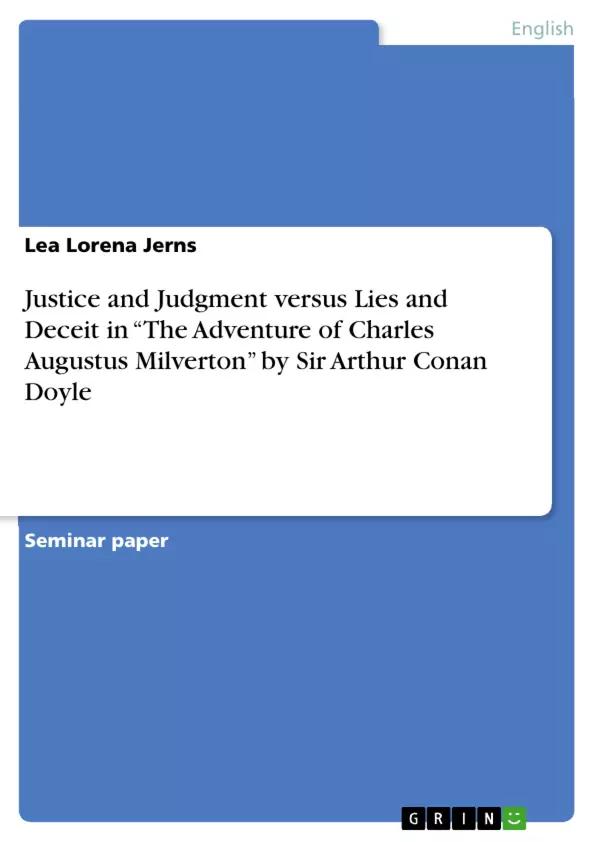Sir Arthur Conan Doyle’s master detective Sherlock Holmes is one of the most famous literary figures in the world. He is known by almost everybody, whether people have read his stories or not.
This paper is intended to discuss and to contrast the topics “Justice and Judgment” and “Lies and Deceit” with regard to the short story “The Adventure of Charles Augustus Milverton” written by Sir Arthur Conan Doyle.
For Sir Arthur Conan Doyle’s fictional character Sherlock Holmes “[…] the social order is something to be both upheld and defied. On one hand, his bohemian nature rebels at class distinction and privilege, while on the other hand he takes extreme measures to rescue the aristocracy from scandal” (Doyle, Steven; Crowder, David A. 74).
I personally chose this short story on the one hand because of the presence of one of Holmes’ biggest opponents apart from Professor James Moriarty, his gofer Colonel Sebastian Moran and Irene Adler – the already mentioned Charles Augustus Milverton – and on the other hand because of the fact that Sherlock Holmes himself commits a crime in this story.
My aim in the conclusion of chapter 4 will be to consider whether lies and deceit or justice and judgment gain the upper hand in “The Adventure of Charles Augustus Milverton” or if there is simply no clear line that makes it possible to separate both topics from each other.
Inhaltsverzeichnis (Table of Contents)
- Introduction
- Justice and Judgment in The Adventure of Charles Augustus Milverton
- Lies and Deceit in The Adventure of Charles Augustus Milverton
- Conclusion
- Bibliography
Zielsetzung und Themenschwerpunkte (Objectives and Key Themes)
This paper examines the concepts of "Justice and Judgment" and "Lies and Deceit" within Sir Arthur Conan Doyle's short story, The Adventure of Charles Augustus Milverton. It explores how these themes manifest in the actions and motivations of Sherlock Holmes and other characters, particularly in relation to the criminal activities of Charles Augustus Milverton.
- The clash between Sherlock Holmes' personal sense of justice and the formal legal system.
- The role of class and social mobility in shaping the characters' motivations and actions.
- The consequences of deception and the moral ambiguity surrounding the protagonist's actions.
- The exploration of Victorian England's societal norms and the influence of class consciousness.
Zusammenfassung der Kapitel (Chapter Summaries)
- Introduction: This chapter introduces the reader to the context of Sir Arthur Conan Doyle's iconic character, Sherlock Holmes, and his place in literature. It outlines the themes of justice, judgment, lies, and deceit that will be explored in the story, The Adventure of Charles Augustus Milverton. The chapter also sheds light on the social and historical context of Victorian England and its impact on the narrative.
- Justice and Judgment in The Adventure of Charles Augustus Milverton: This chapter examines how Sherlock Holmes navigates the tension between his personal sense of justice and the formal legal system. It explores the extent to which Holmes is willing to disregard the law in pursuit of what he deems to be a just outcome. The chapter also delves into Holmes' complex relationship with the police and his perception of their competence.
Schlüsselwörter (Keywords)
The key themes and concepts explored in this paper include: Sherlock Holmes, Victorian England, class consciousness, justice, judgment, lies, deceit, crime, morality, law, social order, and the relationship between individual justice and the formal legal system.
Frequently Asked Questions
What are the central themes of "The Adventure of Charles Augustus Milverton"?
The story explores the conflict between Justice and Judgment versus Lies and Deceit in Victorian society.
Why is Charles Augustus Milverton considered a unique villain?
He is a blackmailer who preys on the aristocracy, forcing Sherlock Holmes to step outside the law to stop him.
Does Sherlock Holmes commit a crime in this story?
Yes, Sherlock Holmes commits burglary by breaking into Milverton's house to destroy incriminating letters.
How does class consciousness affect the plot?
The story highlights the fear of scandal among the aristocracy and Holmes' willingness to defy class distinctions to achieve justice.
What is the relationship between personal justice and the legal system in the story?
Holmes often finds the formal legal system inadequate to deal with moral criminals like Milverton, leading him to execute his own form of "judgment."
- Quote paper
- Lea Lorena Jerns (Author), 2015, Justice and Judgment versus Lies and Deceit in “The Adventure of Charles Augustus Milverton” by Sir Arthur Conan Doyle, Munich, GRIN Verlag, https://www.grin.com/document/308722



